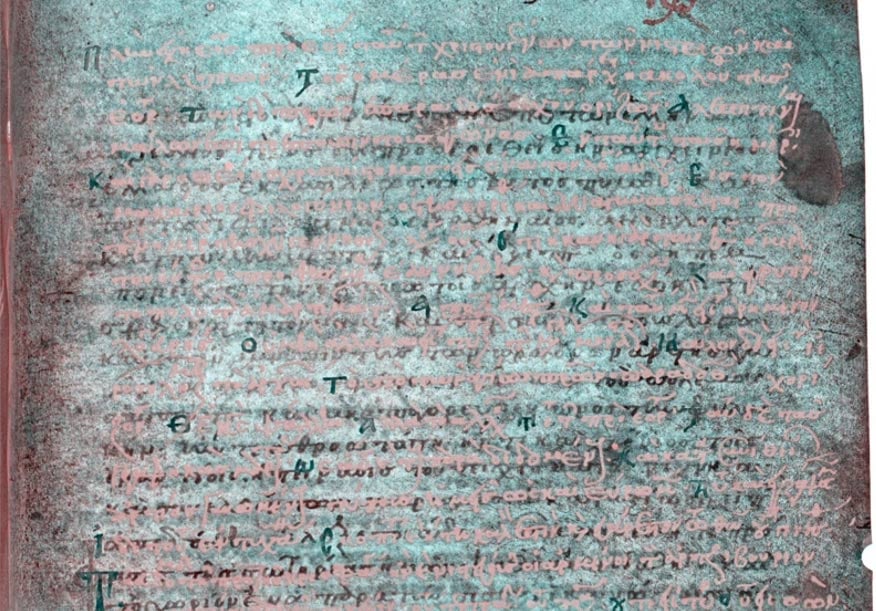Epic Battle between Goths and Greeks Revealed in Long Lost Ancient Text
A dramatic passage detailing a Gothic invasion of the Roman Empire in an ancient text that had been lost to history has been found and translated into English. Fragments of the ancient historian Dexippus’ third-century account of the Gothic invasion was copied in an 11 th century manuscript that was in the Austrian National Library.
Two historians, Christopher Mallan of Oxford University, and Caillan Davenport of the University of Queensland in Australia, used spectral imaging to enhance the ancient text fragments in the 11 th century manuscript and translated them into English.
The Goths were advancing on the Roman Empire around 250 AD when they were repelled at Thessalonica, says Live Science in an article about Mallan’s and Davenport’s work.

The 3rd-century Great Ludovisi sarcophagus depicts a battle between Goths and Romans. (public domain)
The ancient text states: "Making an assault upon the city of the Thessalonians, they tried to capture it as a close-packed band. Those on the walls defended themselves valiantly, warding off the battle columns with the assistance of many hands.”
So the Gothic forces turned toward Athens, which was then part of the Roman Empire, “envisioning the gold and silver votive offerings and the many processional goods in the Greek sanctuaries, for they learned that the region was exceedingly wealthy in this respect.”
A Greek force met them at Thermopylae, a pass in the mountains of northern Greece, about 85 miles (136 km) north of Athens.

Thermopylae pass in Greece where the epic battle took place (public domain)
Dexippus wrote:
Some [of the Greeks] carried small spears, others axes, others wooden pikes overlaid with bronze and with iron tips, or whatever each man could arm himself with. When they came together, they completely fortified the perimeter wall and devoted themselves to its protection with haste.
The commander of the Greek forces, Marianus, makes a speech exhorting the troops to bravery and recalls the 5 th century BC Persian attack on Sparta that ended in Persian defeat at Thermopylae. The modern historians translate Marinanus’ speech:
O Greeks, the occasion of our preservation for which you are assembled and the land in which you have been deployed are both truly fitting to evoke the memory of virtuous deeds. For your ancestors, fighting in this place in former times, did not let Greece down and deprive it of its free state. In previous attacks, you seemed terrifying to the enemies. On account of these things, future events do not appear to me not without hope …
The fragment breaks off before Marianus’ speech ends, and the outcome of the battle in Dexippus’ text is left unanswered. Live Science says Dexippus probably invented Marianus’ speech, though the commander may actually have spoken to the troops.
Mallan and Davenport’s article was published in the Journal of Roman Studies.
Two other researchers, Jana Gruskova of the University of Bern and Gunther Martin of Comenius University in Bratislava, published the fragments relating to the Thermopylae battle first in 2014, Live Science says.
One fragment records a speech attributed to Emperor Decius, again probably invented by Dexippus, in which the emperor urges the troops on to victory. Decius was Roman emperor during the first Gothic incursions and tried to stop them and hold the empire together. He lost troops, territory and eventually his life in the process.

A marble bust of the Roman Emperor Decius from the Capitoline Museum in Italy (public domain)
Gruskova and Martin translated the fragment giving Decius’ purported speech to the troops:
Men, I wish the military force and all the provincial territory were in a good condition and not humiliated by the enemy. But since the incidents of human life bring manifold sufferings … it is the duty of prudent men to accept what happens and not to lose their spirit or become weak.
The Goths’ first incursions into Roman territory were in Hungary in 238 AD, where they took the city of Histia. In 251 Emperor Decius and his son were killed in battle and their forces destroyed at Abrittus.
Many Goths lived as Romans and fought in their armies. But later the northern European Goths, who suffered ill treatment including slavery, from the Roman Empire, sent waves of troops and even sacked Rome itself in 410 under Alaric.
For further reading, see the complicated history of the Goths and Romans in an article at The Ancient History Encyclopedia.

‘Alaric enters Athens in 395’ by A. Stewart, 1915 (public domain).
Featured image: Researchers used spectral imaging to read the writing on this fragment, which details the third-century Thermopylae battle. Credit: Vienna, Austrian National Library, manuscript Hist. gr. 73, fol. 193r lower text.
By Mark Miller



















